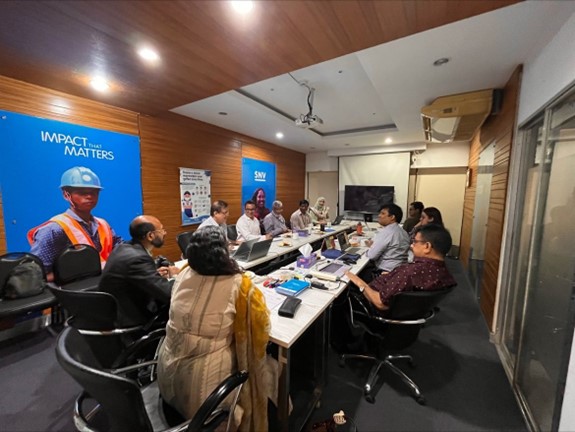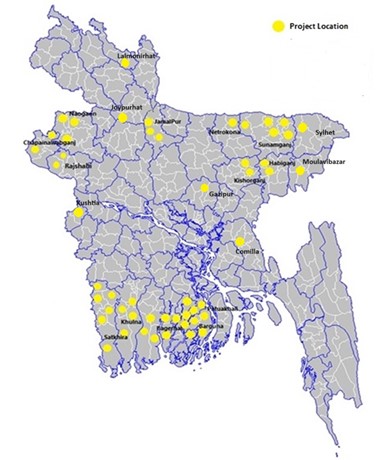
BRAC, IRC, Max Foundation, Simavi and SNV share experiences and identify priority actions for a new Bangladesh platform.
Published on: 17/05/2024

1st Meeting of the EKN Cross-Learning WASH Platform, 28th April 2024. Credit: SNV
Bangladesh has made strides in improving water and sanitation infrastructure over the years, but it continues to face significant challenges in ensuring access to clean water and adequate sanitation for all its citizens. People living below the poverty line still lack access to basic sanitation and safe water. The rest, especially in the rural areas, struggle to ensure proper maintenance of the sanitation infrastructure as well as to move from basic to safely managed sanitation (see fig. 1).
Figure 1: JMP 2022 urban and rural data of Bangladesh
The Government, development partners (DPs), non-governmental organisations (NGOs), civil society organisations (CSOs) and the private sector are all working to improve the situation. Nevertheless, they are often criticised for working in silos and not sharing their experience and lessons learned. Despite the existence of several national level platforms, horizontal and cross-sectoral learning is very limited. Similar to other DPs, the Embassy of the Kingdom of the Netherlands to Bangladesh (EKN) supports several NGO-led WASH programmes. In an attempt to "break down the silos", the EKN has recently initiated a cross-learning WASH platform, which aims to support collective action towards building a resilient WASH sector in Bangladesh. The first meeting was hosted by SNV. BRAC, Max Foundation, Simavi and IRC WASH were participating partners. The meeting took place on 28th April 2024.

Figure 2: Locations covered by EKN supported WASH projects in Bangladesh
In the meeting, each partner shared their project activities, outputs, challenges and the way forward. For instance, BRAC and IRC WASH are implementing the ‘Equitable and Sustainable WASH Services in Bangladesh Delta Plan Hotspots’ project in 45 subdistricts under four climate change hotspots (coastal, haor, barind and floodplain estuary). The project aims to provide one million rural people with safely managed water and sanitation services. The project uses three pathways to achieve its objectives:
SNV is active in 12 municipalities to improve sanitation, solid waste management and greywater management services. Their project is called ‘Transitioning to Sustainable Urban Water Cycles in Bangladesh” and covers municipalities spread over eight districts. It involves enabling governance, regulation and enforcement. This includes strengthening municipal-level finance and investment as well as flood and drought management. To leverage finance, SNV is promoting public-private partnerships, working with organisations such as the Bangladesh Municipal Development Fund (BMDF) and the World Bank-hosted 2030 Water Resources Group (2030 WRG).
Max Foundation focuses on rural areas. It works mainly in coastal areas to improve safe water, sanitation and hygiene services with a broader vision to improve the nutrition and health status of rural communities. It has introduced mini piped water supply systems each serving 50-100 households with 80-100 litres/person/day. So far 40 of such schemes have been built and are functioning. A social enterprise Max Tap Water was set up to run the piped water schemes. model. The Foundation also supports rural entrepreneurs to strengthen the WASH supply chain.
Simavi in its recently completed WASH SDG WAI subprogramme worked in seven municipalities and 20 union parishads (villages). With its Dutch and local partners, Simavi adopted several approaches to strengthen the demand and supply side of WASH service delivery. The approaches include:
From the presentations, it was clear that these organisations foster a systems strengthening approach to attain sustainable and resilient WASH services, addressing both the demand and supply side of the service chain. Fig. 3 illustrates the approaches adopted by the EKN WASH partners in their projects.
During the meeting the WASH partners identified several common challenges or bottlenecks, including:
Based on the discussions, the meeting identified the following priority areas for the cross-learning platform:
The cross-learning platform has decided to meet once every quarter to check progress and identify new challenges and priorities. The platform pledges to enhance communication with the wider sector to close the knowledge gap
This blog is jointly written by Dr. Shibly Sadik, Senior Policy Advisor, IWRM at the Embassy of the Kingdom of the Netherlands in Bangladesh and Digbijoy Dey, Senior Programme Officer, IRC WASH. It was edited by Tettje van Daalen and Cor Dietvorst, IRC WASH.
At IRC we have strong opinions and we value honest and frank discussion, so you won't be surprised to hear that not all the opinions on this site represent our official policy.